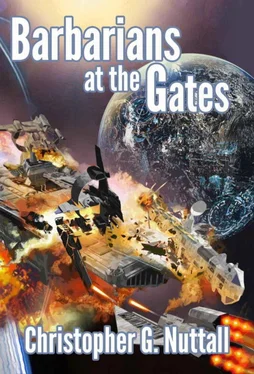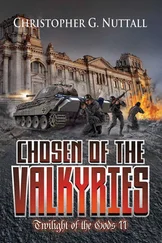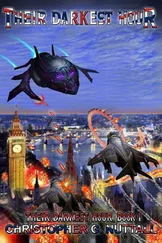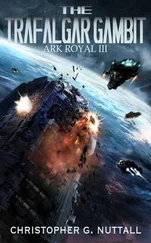“Yes, lieutenant? What have you detected this time?”
Admiral Justinian’s military machine was, somewhat to his regret, less formal than the Federation Navy. Proper military discipline would come in time, Joseph was sure, but until then he’d just have to suffer. He didn’t regret signing up with the admiral when his recruiters had found him on the colony he’d chosen as a retirement home, yet there were times when he wondered if Justinian’s grand plan to reshape the Federation would succeed. The news from the war front, heavily censored through it was, was not good. The war had stalemated.
The youngster managed to look offended, even though he was also keen to show off. “We picked up a signal from a starship that just entered the system…ah, entered the system some hours ago,” he reported. “The Governor-General is requesting a meeting between his ships and our squadron for transfer of classified material. There is also an ID header from Secretary Festal directing us to comply with the request.”
“Interesting,” Joseph said thoughtfully. A month ago, the Secretary and his staff—and the admiral’s daughter—had entered the Marx System through the Asimov Point and headed off towards The Hive and the Asimov Point that would take them deeper into Hartkopf’s territory. Joseph had strongly recommended an escort, but Hartkopf’s ambassadors had warned that their superior would not accept armed ships in his territory before the treaty was signed. “Do they say why, I wonder?”
“No, sir,” Harwich said. “They’re just repeating the same message.”
Joseph nodded. Admiral Justinian preferred to rely on military men in his government, but he’d had to accept a number of civilian experts, including the Secretary of Foreign Affairs. The title was something of a joke, Joseph had privately concluded, yet it might have had a point. An alliance with Hartkopf might be just what Justinian needed to turn the tide of the war. And that meant that anything Joseph did wrong might imperil the alliance.
He looked down at the display. The admiral hadn’t been able to spare any more units, leaving Joseph with nothing more than a squadron of heavy cruisers and a handful of gunboats, but the fortresses defending the Asimov Point were modern and powerful. They could hold it against anything less than a couple of squadrons of superdreadnaughts, backed up by assault carriers and starfighters. Even if his entire force was destroyed, the Asimov Point would be safe, and so would the inhabited planets through the distortion in time and space.
They might as well honor the request. Governor-General Hartkopf had to be coddled, for now at least.
“Order the helm to set us on an intercept course,” he ordered. “We may as well take the opportunity to run a few tracking exercises while we’re away from the fortresses.”
“Yes, sir,” the youngster said, turning back to his console.
“Thank you, lieutenant,” he said. “Put it on the main display. I’ll command from the flag bridge.”
* * *
“They’ve taken the bait, sir.”
“It looks like it,” Roman said. “Keep monitoring them with passive sensors only.”
The sick feeling in his chest was growing stronger. He hadn’t planned a fleet operation—technically, a squadron operation—before, and all nine ships in the fleet were under his command. Part of him wished that Admiral Mason had chosen to place a more experienced officer in command, but Mason had reminded him—not without a thoroughly sardonic smile—that the Federation Navy’s tradition was very clear. The man who dreamed up the plan would be charged with actually turning it into reality.
He settled back in his command chair and tried to relax. It wasn’t easy. Marx’s Asimov Point was unusually close to the system’s primary. They were actually deeper in the mass limit than they’d been in any of their prior engagements—even Jefferson—and if something went wrong, escape might prove to be tricky. The Marx System might not be as dead as The Hive, as there were small colonies scattered throughout the system and a gas giant operation orbiting the larger of the system’s twin gas giants, and there might be enemy starships lurking elsewhere.
Centuries ago, before the dawn of spaceflight, a philosopher-prophet named Karl Marx had come up with what he called the ultimate destination of humanity: pure and perfect communism. His discovery had led to the creation of some of the darkest regimes in human history, despite which far too many people had continued to hold a faith in communism that was almost religious. The attempts to found communist planets had failed, but the settlers of Marx believed they had a solution. If communism was too perfect for humanity, they would create a new breed of humanity that would be capable of accepting and following their tenets. They’d eventually started breeding modified humans—in defiance of Federation-wide law—with altered brains.
At first, it had seemed like the whole project was succeeding, until some of the older altered humans started to show an incredible number of instabilities. Even in the Fortieth century, tampering with human brains was difficult and very dangerous. It hadn’t been long before the entire planet was torn apart by war and most of the population exterminated. Their brains had simply been too warped to live.
He watched the display as the enemy ships crawled closer, praying that the ECM worked. Admiral Justinian hadn’t dispatched his modern ships to watch the back door, so the ECM should be successfully mimicking ships known to belong to Hartkopf, but if the developers were wrong they might be heading into a missile duel at knife-range. In such a battle, the person who fired the first shot often fired the last one. If they were really lucky, they would destroy the enemy ships before they managed to get a shot off.
“Captain,” the communications officer said suddenly. “They’re demanding verification of our codes.”
Roman frowned. They’d interrogated Admiral Justinian’s Foreign Secretary and he’d provided them with his authorization codes, but a paranoid mind would insist on having other codes, ones that might have been lost with the Harmonious Repose . The interrogators were convinced that the prisoners knew nothing of any other codes, yet it was quite possible that the liner’s commander had orders to keep his codes apart. And he’d gone down with his ship.
“Repeat the message,” he ordered. They’d created a computer simulation of the Foreign Secretary, but it wouldn’t hold up to more than casual scrutiny. If someone on the other side actually knew the man personally, they’d be able to see through the deception. “Inform them that we have to transfer certain classified components as soon as possible.”
“Aye, sir,” the communications officer said.
* * *
Joseph had been a serving naval officer for over sixty years and, unlike some officers he could mention, he hadn’t shied away from the prospect of battle. He’d earned his stripes, unlike the officers who were promoted merely for looking good at inspection time, and every instinct he had was screaming a warning. He couldn’t put it in words, yet something was wrong. Why, exactly, would Hartkopf want to transfer classified components to his ships?
His orders said that he had to be diplomatic when dealing with Hartkopf’s starships, but they didn’t say that he had to obey their every command, even if one of them was carrying the Foreign Secretary. Besides, even if they were perfectly innocent, the exercise would do them good. Admiral Justinian had been a fleet commander himself. He’d understand.
“Inform them that they are to reduce speed, hold position and cut their shields,” he ordered. “I want to board them and inspect their cargo before we allow them any closer to us.”
Читать дальше












